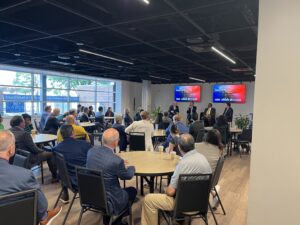Christina Siebold, Q Strategies
When you think of Chattanooga, you probably don’t think of ocean-going threats like weather patterns on the Pacific or piracy. But for one new venture, the Scenic City is the safest place to locate their business helping ships avoid obstacles on the high seas. In fact, for the principals of International Maritime Security Associates (IMSA), relocating their business from Florida to Chattanooga offered a long list of positives.
“A rising tide lifts all boats,” Frank Fenner of IMSA says with a smile. “I first heard that phrase right here in Chattanooga. And it perfectly describes the entrepreneurial environment we found in this city.”
For an old Navy guy, a good nautical metaphor goes a long way.
International Maritime Security Associates (IMSA) opened its doors in Chattanooga in April of 2016, bringing their first-of-its-kind global risk management technology ARMS (Automated Risk Management Solutions) to the Gig City.
IMSA is the collective work of Frank Fenner, COO, and CEO Corey Ranslem. With Fenner’s Navy background and Ranslem’s Coast Guard experience, the two have decades of seafaring experience and just as many decades identifying and consulting on the unique needs of maritime captains.
“Every vessel has specific requirements to ensure they stay in compliance with federal law,” Ranslem says. “One of those requirements is a communication system that receives incoming data about risks from across the globe, which is fed into a computer and then to a dot-matrix printer. Every ship over 500 gross tons has two for redundancy.”
Dot-matrix printers may sound outdated, but the information flow was even more arcane.
“Information coming through the ship system is usually 18 to 72 hours old, and it is not geo-specific. So if I’m captaining a ship in the Caribbean and I’m getting notifications about weather incidents in the Indian Ocean, I’m probably going to shut off the system and potentially miss a critical piece of information.”
Fenner and Ranslem developed a high-tech solution to the challenge – a geographically specific technology that filters millions of bits of data into useful information for each captain to review and then act on by implementing the appropriate protocols.
“We make information useful,” Fenner says.
And now that information flow will originate in Chattanooga.
The journey from south Florida to the Gig City took almost two years, and it all started with a list of must-haves for their young company’s new hometown. Topping the list were two critical factors for any company dealing in high volume data and an around-the-clock operation: gigabit internet and an advanced power grid.
“Everyone knows that Chattanooga is Gig City, but not many people know we have the best power infrastructure in the country with the smart grid,” Fenner says.
The company was especially enthusiastic about EPB’s ability to reroute power and minimize outages, as well as the grid’s sensor technology that dispatches repair crews as soon as an outage occurs, usually before customers even call to report a problem.
The next three key factors in their new potential city included close proximity to a major metropolitan area, outside of severe weather regions and a reasonable cost of living.
“When you put all those factors in a bag, there’s only one name that comes out,” Ranslem says. “Chattanooga.”
Beyond the technology and infrastructure requirements that drove the relocation, Fenner cited a distinctive support structure in the city.
“When most people think of a Chamber of Commerce, they think about old stodgy men in high backed chairs smoking cigars. This Chamber pushes every limit and welcomes everyone to Chattanooga.”
From the Chamber of Commerce to EPB and The Enterprise Center to The Company Lab, Ranslem said every door they walked through held a room of professionals and cheerleaders, eager to open new doors of opportunity to fast track the project.
“The entrepreneurial DNA in this city is different than anything I’ve ever seen,” Ranslem says. “I’ve spent time in a number of cities around the country and nothing compares to what we have seen in Chattanooga.”
Now that the IMSA flag is planted in Chattanooga, the team continues to offer regulatory consulting services to cruise lines, large yachts and marine facilities but focuses most of its time on a second round capital raise and beta testing software before a planned third quarter 2018 launch.
Their team of six employees and more than 50 contractors will balloon to over 100 once the IMSA software and service program hits the international market.
“Over 95 percent of our clients are foreign, so our product and service are exports,” Ranslem says. “We have global reach with a software platform based here in Chattanooga and powered by EPB.”






